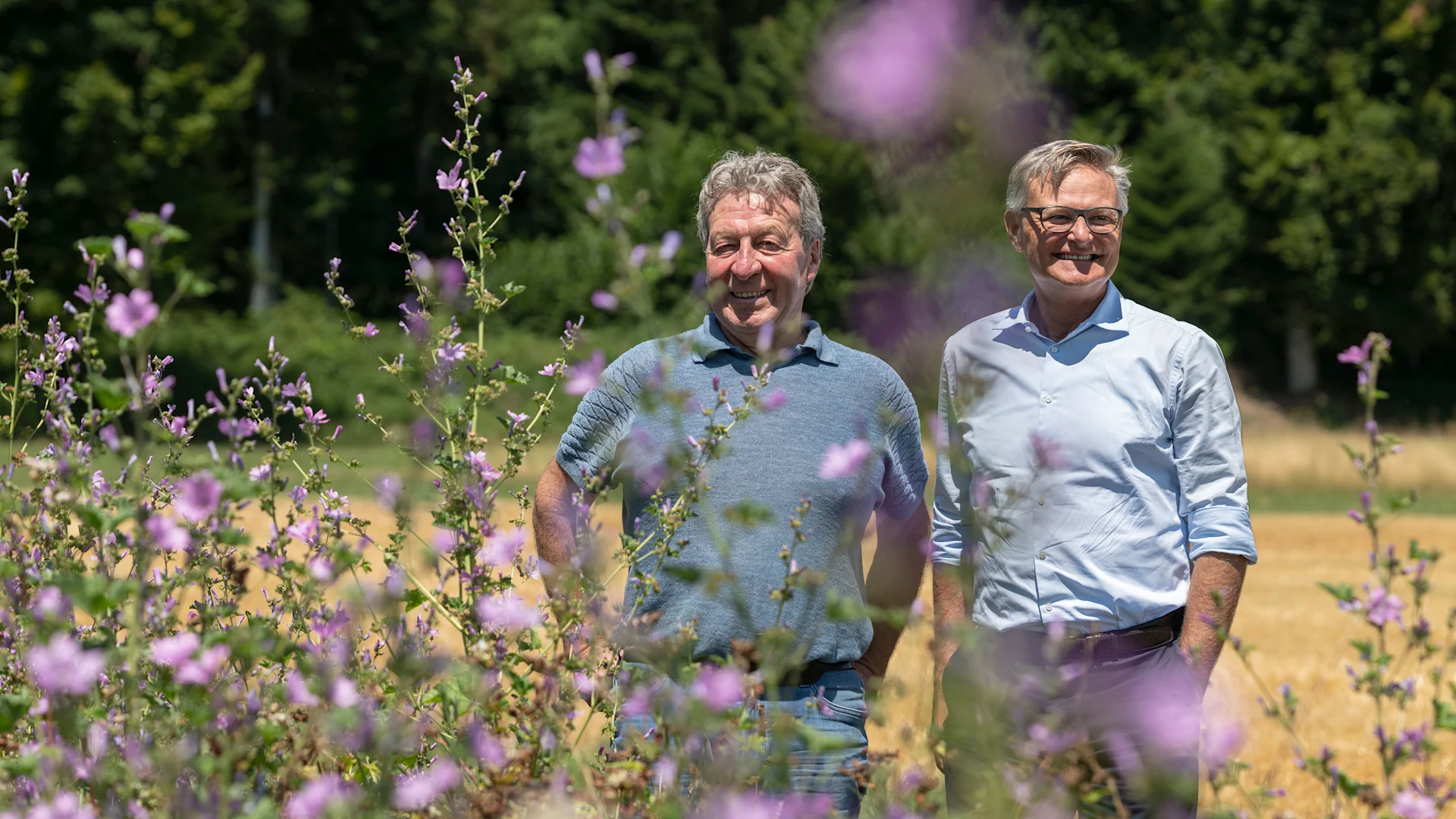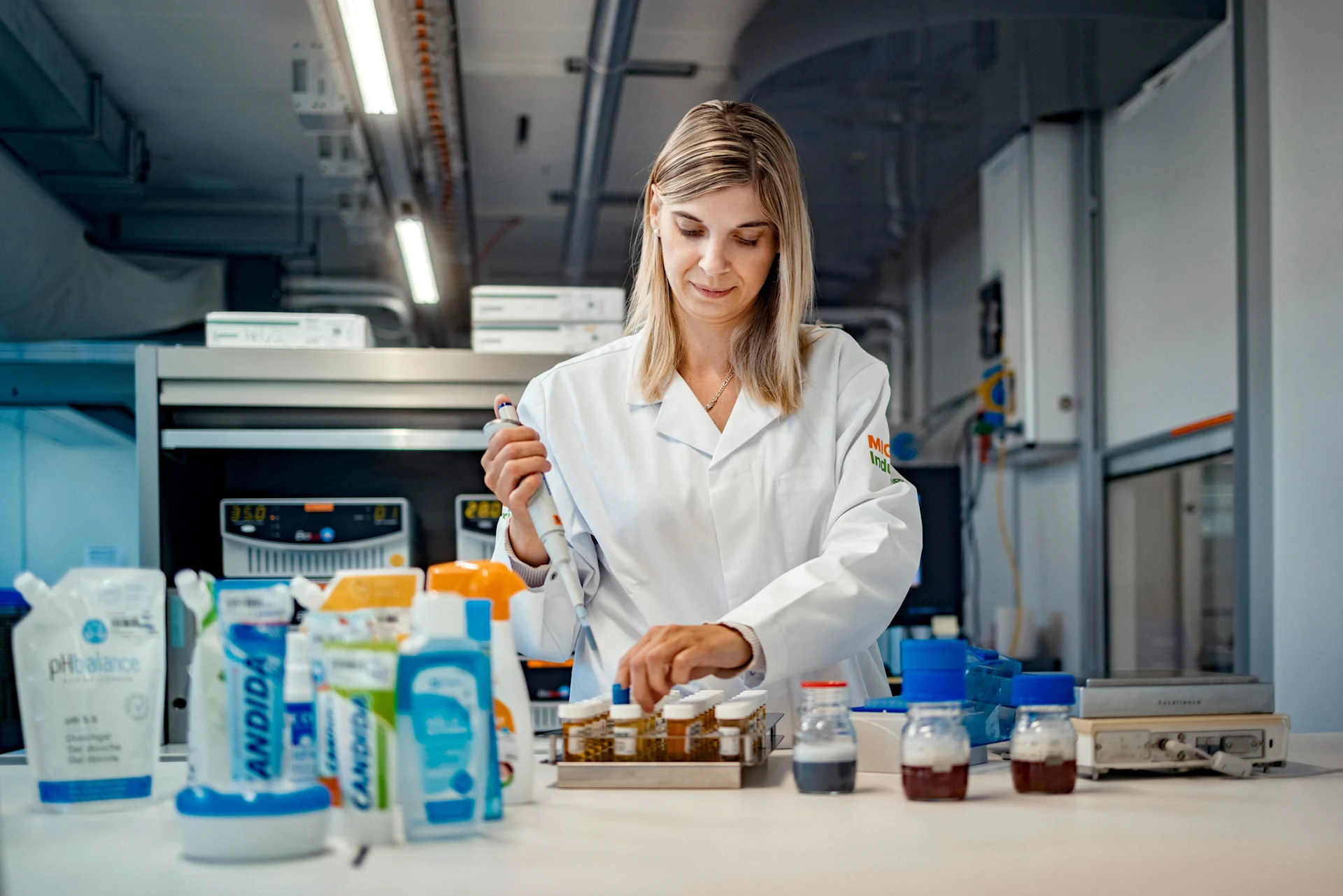
Farming
Top meeting on a farm
Migros CEO Mario Irminger and IP-SUISSE President Andreas Stalder discuss agriculture and fair prices.
navigation
Product safety

Product safety and the associated customer requirements are our top priority. We therefore carry out risk-based product tests and adapt our quality measures specifically to the challenges of our supply chains. We work in partnership with our suppliers, thereby increasing transparency and trust along the value-added chain. This involves, for example, addressing potential risks in a targeted and focussed way and engaging in intensive discussions with specific suppliers.
With its wide range of food and consumer goods, the Migros Group bears a high level of responsibility for the safety of its products and thus for the health of its customers.
We comply with the various laws, guidelines and prohibitions concerning the development, production, sale, use and disposal of products. We also apply our own quality standards that go beyond those of Swiss legislation, for example on pesticides or food additives in products. We apply a risk-based approach to assess whether a product meets our requirements. For example, we ensure compliance with certain temperatures or other conditions that could have a negative impact on product safety. If deviations or deficiencies are identified, we initiate appropriate measures.
We are guided by the principle of “as little as possible, as much as necessary”, which applies to additives in food, for example.
Migros only approves products for its range that are safe in terms of procurement, production, use, consumption and disposal.
We create trust in and enthusiasm for our products. We achieve this through comprehensive expertise. In order to ensure compliance with the strict requirements, we continuously carry out risk-based inspections of suppliers and products in cooperation with accredited inspection bodies, which we collect along the value-added chain.
Together with our suppliers, we take fact-based measures to increase product safety.
Before our products are launched on the market, they undergo strict safety testing and risk assessment along the value-added chain. These are carried out by Swiss Quality Testing (SQTS), a testing laboratory belonging to the Migros Group. Chemical and microbiological analyses are used to test the ingredients. The ingredients are tested using chemical and microbiological analysis and other testing methods. The products are also checked regularly as part of the product range audits to ensure compliance with legal and internal requirements. In 2024, we checked around 3,000 products in our product range audits.
We immediately withdraw defective products from sale or recall them.
Our buyers receive regular, mandatory training on quality assurance in their respective product areas. This applies to all buyers in the areas of food, fresh toys, cosmetics, chemicals and medical products.
Our employees in the stores also receive regular training on hygiene and food handling.
If we identify deviations in the quality or safety of a product, we immediately initiate appropriate measures. We have defined specific processes which we implement consistently, in a coordinated way and throughout the Migros Group. If a health risk is identified, we immediately take back or recall goods, which is decided according to clearly defined escalation levels.
A product withdrawal means the removal of products from the shelves of our stores and distribution centres. In the event of a product withdrawal, the affected products must be removed from the shelves by closing time on the following day.
If there is a health risk and the product has already reached consumers, we immediately recall the goods. We actively inform the media in order to reach as many customers as possible who have purchased an affected product. We ask them not to consume the purchased goods and to return them to one of our stores instead.
When testing food products, we are guided by the Global Food Safety Initiative (GFSI). As part of this international standard, independent inspectors check the food safety of our domestic and foreign suppliers. We require all our suppliers to have GFSI certification. Suppliers who do not have this certification are regularly checked for compliance with food safety by our own inspectors.
Food is subject to regular testing depending on the hazard risk.
We test products for microbiological contamination (e.g. mould or salmonella) and check whether the respective product contains undesirable foreign substances or the permitted quantities.
We test products for genetically modified organisms (GMOs) on a risk basis.
We test products for pesticides, heavy metals and the correct declaration.
To ensure that fruit, vegetables, flowers and plants come from safe and sustainable cultivation, we give preference to products with GlobalGAP or SwissGAP certification. We work closely with the Sustainability & Economic Policy department in this respect.
We analyse the value-added chain of important raw materials on the basis of social and ecological aspects.
In order to guarantee flawless products, we rely on the standards of the Global Food Safety Initiative (GFSI) for processed foods. These ensure that international hygiene guidelines are implemented in production and that contamination with harmful substances or allergens is avoided. This applies both to the food itself and to the packaging materials used that come into contact with the food. Compliance with the applicable regulations is verified annually by independent certification bodies.
All producers who supply us with fresh fruit and vegetables must implement the guidelines of GlobalGAP or, in Switzerland, SwissGAP. These standards include hygiene regulations as well as requirements and guidelines on the use of pesticides and chemicals in cultivation.
Customers can find all the important information about the ingredients, origin and shelf life on the product packaging. This is particularly important for people with allergies or intolerances, for example, so they can see at a glance which allergens are contained. Transparency about the ingredients is also ensured in open sales thanks to mandatory staff training.
Clear and understandable labelling enables customers to identify and compare the origin, ingredients, shelf life and environmental impact of products. This creates transparency and promotes responsible purchasing decisions.
In Switzerland, strict legal requirements apply to the information that must be included on product packaging for the food trade. Our specialists deal with the following questions when checking packaging:
Are allergens declared?
Are the health claims appropriate?
Are our relevant requirements complied with and listed?
If relevant: is the importer specified?
Is the product correctly packaged?
Are the instructions on how to dispose of the product correctly printed on it?
In addition to the legal requirements, we use M-Check to provide further useful information on the properties of numerous products.
We also test near- and non-food products such as cosmetics, toys, electrical appliances and textiles. We work in accordance with strict regulations and use innovative analysis methods to protect the health and safety of our customers. We check the compliance of over 4,000 near and non-food products every year. We also conduct around 3,300 on-site inspections at production plants to assess manufacturing methods.
Products that come into direct contact with the skin or are used by children are particularly risky. In the case of toys, for example, we check whether small parts can be swallowed and whether the materials used can be safely put in the mouth. Products related to heat, electricity or pressure are also considered risky.
In addition to checking the product content, we also examine all instructions for use of our own-brand products (80% of the range). We also check the packaging information such as warnings or disposal pictograms.
Limits and bans on critical substances are regulated by law in Switzerland. For electrical appliances, the use of certain hazardous substances such as mercury, lead or cadmium is regulated in the Restriction of Hazardous Substances Directive (RoHS). In order to be able to offer textiles that are guaranteed to have been produced without harmful chemicals, we introduced the eco standard in 1996.
For products with direct skin contact, such as shoes, jewellery or toys, the use of phthalates (plasticisers) and PAHs (polycyclic aromatic hydrocarbons) in particular is regulated by law. We assign each product to a skin contact class, which in turn depends on the duration of skin contact. Each skin contact class has specific limit values for phthalates and PAHs that are lower than the legal requirements.
The following ingredients are prohibited for cosmetics of our own-brand products:
Formaldehyde and preservatives that release formaldehyde
Preservatives that contain halogens
Thiazolinones
Long-chain parabens
Certain chemical UV filters
Polycyclic musk compounds and nitromusk compounds
Nut oils in baby skin products
Transparent traceability enables us to trace a product back to the individual production, processing and distribution stages. It requires that at least the immediate upstream supplier and the immediate customer are known and recorded at each stage of the supply chain.
GFSI-certified food manufacturers must test and document their traceability system at least once a year. This is verified annually by independent certification bodies.
In order to keep track of suppliers and the relationship with their producers, the entire value-added chain of the products from the supplier to the last processing stage is stored in a database. If necessary, we can trace which suppliers are linked to which producers and take targeted action to limit damage in the event of special incidents.
We are constantly optimising and expanding our range, trying to make as many products as possible more sustainable.